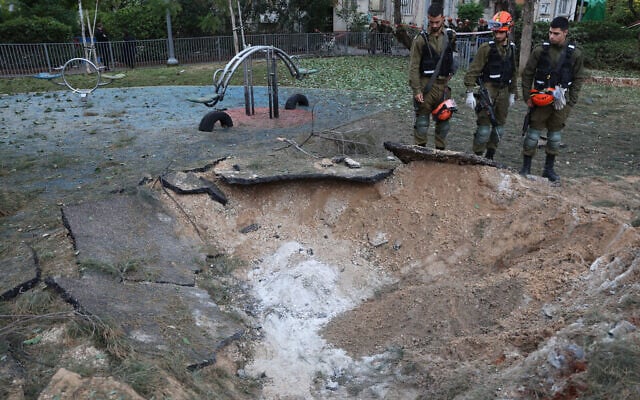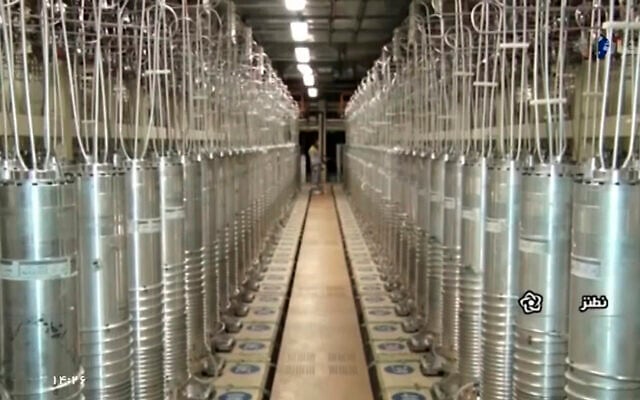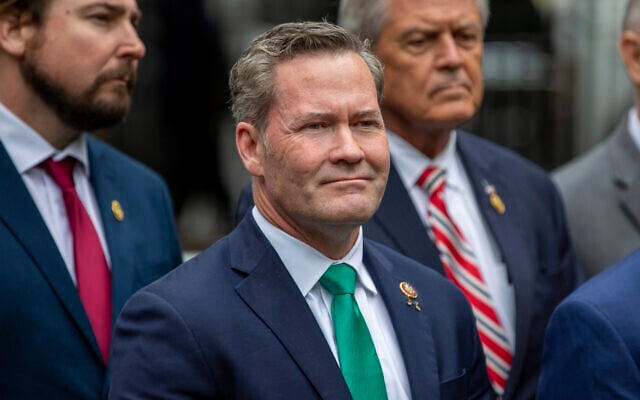Trump national security pick threatens US hostage-takers with ‘bullet in forehead’
Mike Waltz says not enough pressure is being put on those who take Americans captive, but indicates Hamas can survive if it lets them go
Rep. Michael Waltz, Republican of Florida, speaks to the media in New York, May 16, 2024.
US President-elect Donald Trump’s pick for national security adviser warned Sunday that the incoming administration would take a zero-tolerance approach to the taking of American hostages, but indicated that Washington could go along with the continued survival of the Hamas terror group if it releases the US citizens being held in Gaza.
In a podcast interview with conservative commentator Ben Shapiro, Rep. Mike Waltz directed warnings at Hamas, said a vulnerable Iran has to decide what it will do next with its contentious nuclear program, and was optimistic about the chances of normalization between Israel and Saudi Arabia if there is a resolution to the situation in the Gaza Strip.
Waltz said four hostages holding US citizenship are believed to still be alive, noting that they had been held in captivity longer than Americans held in Iran during the 444-day US embassy hostage crisis from 1979 to 1981. That milestone will actually come on Tuesday, which will mark 445 days since the October 7, 2023, onslaught, when Hamas-led terrorists attacked southern Israel, killing some 1,200 people and kidnapping 251, including several people holding US citizenship.
“That’s totally unacceptable, and I think writ large, there has never been enough consequences,” Waltz said. “That’s what we need to be talking about with these people. [If] you take an American… there is going to be all hell to pay. There are going to be nothing but consequences for you financially, and maybe even a bullet in your damn forehead.”
According to Israeli officials, seven of the 96 hostages remaining in captivity in Gaza hold US citizenship, though only three of them are thought to still be alive.
The comments echoed tough talk from Trump and other officials in his inner circle, who have vowed that there will “all hell to pay” if the hostages are not released by his inauguration on January 20.
Waltz indicated that Trump, known for taking a transactional approach to politics and diplomacy, will have no interest in negotiating for the release of captive Americans.
“If the bad guys are incentivized to take more because they keep getting more, then they’re going to keep doing it. If the bad guys feel nothing but cost and pain for taking our people, they’re going to stop doing it,” Waltz said.

“Hamas has every exit blocked except one, and that’s to release our hostages if you want to live,” Waltz added.
The comments may have marked a break with Prime Minister Benjamin Netanyahu and other Israeli leaders, who have declared that Hamas’s military and governing capabilities must be destroyed independent of whether the hostages are released. Israel’s insistence that it be able to resume fighting against Hamas had been among the major factors blocking progress in talks for a hostage release and ceasefire deal.
Waltz credited the isolation of Hamas to Israel’s campaign against Hezbollah, praising Netanyahu for the intelligence operation that saw Hezbollah’s communication devices explode en masse in September, maiming thousands of operatives.
“There’s going to be some amazing movie about that one day — one of the gutsiest, most effective covert action ops in modern history. Because of that, taking down Hezbollah, [which] everybody said couldn’t be done and would be too provocative — [it] expos[ed] Iran’s air defenses so that they literally are naked right now and on their back foot,” Waltz said, echoing talking points used by Netanyahu.

Iran’s nuke program could be affected depending on Tehran’s reaction to Israel’s decimation of Hezbollah, as well as direct Israeli strikes in October which took out air defenses and some military sites in Iran, Waltz surmised.
“Is this a moment where they say we are completely exposed, therefore we rush towards a nuke? Or is this a moment they say, ‘We are completely exposed. [Let’s not] provoke the Israelis by rushing toward a nuke? We’ll see which way they go… I don’t want to reveal our hand, but we’re watching very closely,” Waltz said.
While Iran insists the program is peaceful, it has ramped up uranium enrichment to levels that have no civilian application, according to Western nations and the UN nuclear watchdog.
Waltz said the administration would quickly redesignate Yemen’s Houthi rebels as a terror group. The Iran-backed group, which like Hezbollah and Hamas is sworn to Israel’s destruction, has recently stepped up its long-range attacks on the Jewish state, including a ballistic missile attack Saturday that injured 16 people in Tel Aviv.

“I guarantee what you’re going to see very soon is a redesignation of them for what they are — a terrorist organization,” Waltz said in the podcast interview.
US President Joe Biden removed the Houthis from the Foreign Terrorist Organization blacklist in 2021, in a move pushed by progressive Democrats who feared that sanctions would hamper international efforts to deliver humanitarian aid to civilians in Yemen.
Waltz, a Florida Republican, acknowledged that a humanitarian crisis does exist in Yemen but insisted that Democrats had taken the wrong approach.

He speculated that Trump’s return to the White House would also put efforts for normalization between Israel and Saudi Arabia back on track.
“I think it’s a natural next step,” he said, reiterating Trump’s claim that a deal would have been forged already had the president-elect won against Biden in 2020.
According to Waltz, hopes for a deal had been pinned on both Jerusalem and Riyadh making common cause against Iran as a joint enemy, but that progress was derailed by October 7, which refocused attention on the Palestinians.
Iran saw how close the sides were to a deal “and lit the match with Hamas [that led to] October 7,” he said, which put the Palestinian issue “right back into the center.”
“We’ve had a lot of good discussions with the Saudis [about] normalization,” the Florida congressman added.
“The overall prospects of moving that relationship forward — get our [hostages] out, get the issue of Gaza to a better place, at least for now, and then we absolutely are talking about a broader deal,” said Waltz.

No comments:
Post a Comment